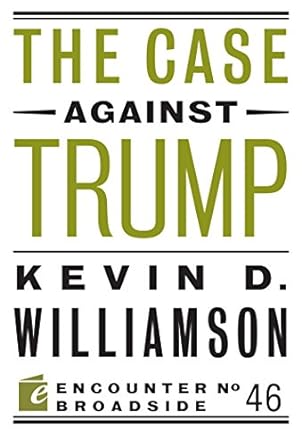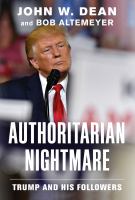Every Trump Book I Read
Passages from books about Donald Trump. Total read: 88 (desktop view only) November 25, 2025 update
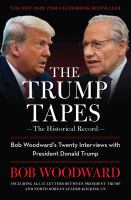

“(Lindsey) Graham, who had talked repeatedly with the president during the crisis, also worried that Trump didn’t want to own the coronavirus problem. ‘He’s got one foot in and one foot out,’ Graham said, describing their call. ‘He wants to be a wartime president, but he doesn’t want to own any more than he has to own.’ Graham told Trump he thought it was Trump’s job to fix the problems, ‘even if it’s not your fault.’ Graham told the president he needed a plan. ‘You need to explain to the country, we’re not helpless against the virus,’ Graham said. ‘Here’s the game plan to beat the virus. You need theater commanders like you’ve got in Iraq or Afghanistan. Somebody in charge of testing. Someone in charge of vaccines. You need a Petraeus to regain your footing. You’ve lost the momentum.’ While Trump’s job approval rating had reached the highest level of his presidency the week of this interview, it was beginning a downward slide as the crisis drew on. ‘You need to peak in October,’ Graham told Trump. ‘You need to have the economy showing signs of life. A vaccine on the horizon. Drug therapies that work,’ Biden would be a rough opponent, Graham told Trump, but his opponent, his real opponent-was the coronavirus. That’s probably true,’ Trump answered. Graham pressed: ‘If you (f) it up, there’s nothing you can do to get reelected. If you seem to manage it well, you’re pretty much unbeatable. You keep the body count down, people will see you as somebody that was successful.’ The next morning, April 6th, I noticed the president began the day on a cheery note. He tweeted all in caps: LIGHT AT THE END OF THE TUNNEL! One of Trump’s allies, United Kingdom prime minister Boris Johnson, came down with the virus and was moved into intensive care. On April 7th, Trump said publicly of the virus: ‘It will go away.’ On April 11th the death toll from the coronavirus in the United States climbed above 20,000. The U.S. surpassed Italy as the country with the most virus fatalities.”
“TRUMP: Well, when you compare (Dr. Fauci)-listen, when you compare that to Biden, and when you compare it to a lot of the people we see, right-no, he’s sharp. And he’s doing a good job. He’s a very dedicated guy. BW: Have you ever sat down alone with him and gotten a tutorial- TRUMP: Yes, I guess, but, honestly, there’s not a lot of time for that, Bob. This is a busy White House. This is a busy White House. We’ve got a lot of things happening. COMMENTARY: He’s talking to me for hours but doesn’t have time to sit with the top infectious disease expert? He doesn’t have time for a lesson on the coronavirus? I again was genuinely and deeply troubled.”
"BW: So what’s the biggest economic issue you think people are going to be voting on at the end of the year? TRUMP: Well, I think the economy, just the economy. You know the issue is the economy. There are lots of little things that go into making a great economy. But when you add it all up, it’s going to be THE economy."
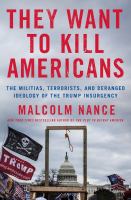

They Want to Kill Americans by Malcolm Nance - 2022
"Trump’s voters, on the other hand, did not believe the (corona) virus was a risk, so they mainly showed up on Election Day. They still fell ten million votes short. . . By the time the Electoral College met on December 12, 2020, Trump had lost fifty-eight cases. When the smoke cleared, he would lose over ninety cases between those filed by his own team and those filed on behalf of his campaign by the Republican Party. All of the big lie lawsuits to stop the electors and get cases moving through what Trump was told was a friendly judiciary had one purpose: steal the election via the courts. With the help of Senate majority leader Mitch McConnell, Trump had filled the judiciary with an unprecedented 226 new judges. He held the record for the most Federal Appeals Court judiciary appointments as well, putting fifty-four of them onto the bench. Since loyalty to Trump was a hallmark of anyone who was appointed to the bench, he assumed the judiciary was in his pocket. Additionally, he had appointed three Supreme Court judges. Now he expected them to give him the 2020 election. . . It was patently clear that Trump thought he had bought the Supreme Court and that they would overturn the election and give him the presidency. He than assumed that the three conservative justices he appointed would ignore the law because they owed him. Trump believed he had rigged the judicial system to do as he wanted. On this point too was he woefully disappointed. The first blow to his carelessly crafted strategy came on December 10, 2020. The Supreme Court rejected the request by the campaign to stop the certification of Pennsylvania’s mail-in votes. On December 14, the Electoral College certified the electors for Joe Biden, the president-elect. But Trump’s lawyers did not care. In a desperate move, some state Republican parties selected their own electors. Republican parties in Arizona, Colorado, Oregon, Michigan, and Pennsylvania illegally appointed partisans who planned to force their way into statehouses to stop the true electors from certifying the results. After all the effort and drama, the final certifications were submitted to Congress. Trump considered more extreme options as well. Sidney Powell and former general Michael Flynn visited the White House repeatedly in December. They tried to convince Trump he had the power to declare martial law and seize power by using the armed forces. They implored Trump to just ignore the Constitution and establish a ‘salvation’ government. Trump supporters were ecstatic when that idea was floated. They were openly advocating for Trump to use the Insurrection Act. Many prepared for civil war. Tens of thousands of comments online supported seizing power and arresting Democrats in order to ‘save America.’"
"The right-wing extremists first held a torch-lit night march reminiscent of the Nazis’ Nuremberg rallies. The next day, they tore into the lines of liberal protesters and a melee ensued. One alt-right militant drove his car into a crowd of protesters and killed a young woman named Heather Heyer. The youth wing of the conservative movement had made its mark. By evening, all of America and, by extension, the world knew who the alt-right were. At the time, they were all unabashed supporters of President Trump, but the love was not publicly or openly reciprocated until the day of Heather Heyer’s death. President Trump knew who they were; they were Trump voters. Instead of condemning their actions, the called them ‘very fine people.’ The savageness of the national rejection stunned Trump, but it also stunned the alt-right. Seemingly overnight, even the limited public support for their activities disappeared. However, the violence did not. Over the next two years, flashes of their pro-Trump extremism would emerge: a series of attacks on synagogues in Pennsylvania and California that killed Jews; an anti-immigrant mass shooting in Texas that massacred Mexican American; the mailing of sixteen pipe bombs to the Democratic party leadership in an attempted assassination by Cesar Sayoc, an unabashed Trump supporter, who built the bombs in a van festooned with Trump images and dozens of bumper stickers spewing hatred of liberals and Democrats and who was subsequently arrested by the FBI. All of these terrorist attacks revealed a trend. The perpetrators were almost exclusively supporters of President Trump and his most hateful policies. These incidents also revealed that the alt-right had not actually disbanded after being called out in Charlottesville. In the run-up to the 2020 election, they assimilated so deeply into the pro-Trump Make America Great Again masses that they just seemed to disappear from the political stage. In fact, they went underground. . . in the open. They adopted the red MAGA hat as a form of camouflage and became indistinguishable from the average angry Trump voter. In the chrysalis of Trump rallies, few recognized their transformation into a giant multiarmed hate monster. Like the fictional radiation-eating Mothra, they fed and grew more powerful on their enemies’ detestation. During the summer of 2020, they finally revealed themselves as a much larger armed militant force determined to use the Second Amendment as both a shield and a potential cudgel to bully the nation."
Begin Again by Eddie S. Glaude Jr. - 2020
“But most of Donald’s showy and unwise investments kept losing money faster than one could count it. All three casinos closed and the Park Plaza Hotel declared bankruptcy in 1992. While Trump lost a whack of his own money, it was the various banks, buyers of his junk bonds, and hundreds of subcontractors who had built Trump’s casinos who took the big hit. Unlike William Zeckendorf, Donald Trump avoided personal bankruptcy thanks again to his father and to his siblings with whom Fred Trump had stashed large piles of assets. The junk bond holders found they held junk. Many of the subcontractors went out of business, ruined because they could not afford the long court cases Trump threw up to keep from paying them for the work they had done. There is no record of Trump’s expressing regret for their losses. Tony Schwartz wrote, ‘I never saw any guilt or contrition about anything he’d done.’ He observed that Trump ‘seems unconstrained by even the faintest hint of conscience. Trump feels no more shame over his most destructive behaviors than a male lion does killing the cubs of his predecessor when he takes over a pride. The banks, whom Trump owed nearly $2 billion, decided at the end of 1990 not to call in their loans (which would have lost them most of that money) but instead negotiated with Trump and effectively took over most of his assets, which they hoped to sell off. They left Trump officially in charge of the operations in the belief his name added value to the properties. He was given a living allowance of $450,000 per month that enabled him to live a very extravagant lifestyle and convince others his name was still worth its weight in gold, not lead.”
“Donald Trump faces indictment on numerous crimes once he leaves (the presidential) office, and he has probably spent more time worrying about how to escape criminal prosecution than he has on containing COVID-19. He thinks he can pardon himself. Whether he can would be decided by the Supreme Court. His surest path to staying out of jail would be to remain president- the American voters, the Electoral College, and the Constitution be dammed. Thus, Trump, like many deposed demagogues before him, may well use his supporters’ willingness to die for him to bargain an escape from ever standing trial. He would in effect be saying to his successor, ‘Don’t you dare try to punish me for breaking the law. I will ignite a civil war and ruin the country if you do.’ This is how authoritarians usually try to escape when the jig is up. It is all about them to the last minute.”
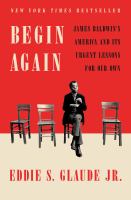

"I can imagine my conservative friends crying foul, saying that I am too harsh and bitter, that Trump's election was not simply about race and that economics were more important, and they would be genuinely sincere. But sincerity can often be a mask for cruelty, especially the cruelty of conscious disavowal. To agree with me entails much more than condemning Trump. It necessitates an honest confrontation with and condemnation of one's complicity with a way of life that insists some people matter more than others and with a society organized to reflect that belief. Baldwin has it right when he says: 'Americans are always sincere, it is their most striking and appalling attribute. . . Nixon was perfectly sincere when lying about Watergate, the military were perfectly sincere when lying about Vietnam and Cambodia, Helms is perfectly sincere when he says that he is not a racist, and the late J. Edgar Hoover was sincere when he called the late Martin Luther King, Jr. the biggest liar in America. This sincerity covers, and pardons all, [and] is the very substance of the American panic.' Baldwin cuts to the heart of the matter here. Our sincere commitments to democracy have always been shadowed by the lie evident in our practices."
"One of the more insidious features of Trumpism is that it deliberately seeks to occupy every ounce of our attention. In doing so, it aims to force our resignation to the banality of evil and the mundaneness of cruelty. To invoke T.S. Eliot's Burnt Norton, Trump aims to 'distract us from distraction by distraction.' He greedily intrudes on our time, seeking adoration or our scorn. It becomes, at least for me, next to impossible to turn him off, but I know I am not alone in feeling trapped. Trump's followers are all too often consumed with a debilitating anxiety about the current trajectory of the country, as they are told repeatedly by Fox News and in Trump rallies that America has been overrun by those who don't look like them. That anxiety seeps into every nook and cranny of our politics and demands everyone's attention. We are told constantly we must remedy this anxiety: Who is speaking for the white working class? Who represents rust-belt America? Who is talking to the so-called forgotten American? Every time I hear that question asked, especially by white liberals, I sink deeper into a kind of depression or rage, because these are just nice ways of saying that white people matter more that others."
"For Donald Trump it was a very busy weekend dedicated to overturning the election. He had been claiming for weeks that the election had been stolen from him. That was all a lie. But as the time was running out on his presidency, he set out to steal the election for real. This was a multidimensional effort. He was pushing his Republican allies in Congress to disrupt the counting of votes, pressuring local officials to undo results on the state level, trying to get an assist from the Supreme Court, and demanding his vice president use power he didn’t really have. But there was one other move he attempted that weekend that almost nobody knew about at the time. While Trump was reaching out to Raffensperger and turning the screws on his vice president, he was also secretly conferring with an obscure environmental lawyer at the Justice Department named Jeffrey Clark about taking over as acting attorney general and using the power of that office to overturn the election. . . One of his colleagues described him to me as ‘a slightly awkward, dorky lawyer’ who had expertise in environmental law and no experience whatsoever in election law. . . (Clark) believed that wireless thermostats made in China for Google by a company called Nest Labs might have been used to manipulate voting machines in Georgia. This idea was nuts, but it intrigued Trump, who asked Director of National Intelligence John Ratcliffe to look into it. In a meeting in late December, Clark - who had told nobody at DOJ about his conversations with Trump – shocked the senior leadership at the Justice Department by proposing to force Georgia to effectively reverse Biden’s victory in the state. In an email to acting Attorney General Jeffrey Rosen and Deputy Attorney General Richard Donoghue dated December 28, 2020, Clark presented a five-page document he had drafted to put officials in Georgia on notice with a demand to convene a special session of the state legislature to deal with election fraud. . . The senior leadership at DOJ shot down Clark’s call for the Justice Department to pressure Georgia or any other state to overturn their election results. ‘There is no chance that I would sign this letter or anything remotely like this,’ Donoghue responded in an email to Clark. ‘While it may be true that the Department ‘is investigating various irregularities in the 2020 election for President’ (something we typically would not state publicly) the investigations that I am aware of relate to suspicions of misconduct that are of such small scale that they simply would not impact the outcome of the Presidential Election.’ . . Clark secretly took it to Trump and presented himself as the person willing to do what the others had refused to do. In the early afternoon of Sunday, January 3, Clark informed Rosen that Trump had decided to put him in charge of the Justice Department and that Rosen was out as acting attorney general. Rosen said he needed to hear it directly from the president and a meeting was scheduled for six p.m. at the White House. . . . The meeting lasted for well over two hours, but it quickly became apparent that ousting Rosen was going to backfire. Rosen told Trump that DOJ had no legal authority to do what Clark was proposing. And (Assistant Attorney General Steven) Engel told Trump if he followed through with his plans, there would be mass resignations that would make it impossible for Clark to do his job, as well as create a massive public relations disaster."
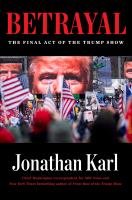

Authoritarian Nightmare by John W. Dean and Bob Altmeyer - 2020
Betrayal by Jonathan Karl - 2021
“By dawn, the president’s entire schedule for the coming week would be canceled. And within eighteen hours, he would be taken in the Marine One helicopter from the White House to Walter Reed National Military Medical Center, where he would be treated by an army of doctors with the kind of aggressive experimental drugs only given to COVID patients with serious connections who were fighting for their lives. Another reason to be skeptical about what Dr. Conley was saying about the president’s health was the constant stream of misinformation coming from the White House about the pandemic. Just a week earlier, Trump had declared at a rally in Ohio that coronavirus ‘affects virtually no one.’ That was one hell of a statement. Already 20,000 Americans had died from COVID-19 and nearly seven million had been infected. Over the course of the next forty-eight hours, just about everybody in the president’s orbit seemed to become infected with coronavirus, including his campaign manager, his personal assistant, two of his most important political advisors, the chairwoman of the Republican party, and three Republican senators. The Trump White House’s lack of credibility on the pandemic was well established. Exactly three weeks before Trump tweeted he had tested positive, I had enraged him by asking the most forcefully confrontational question I had ever asked of a president – or any other political leader. ‘Why did you lie to the American people and why should we trust anything you have to say now?’ I asked him during a press conference on September 20, 2020. . . The flagrant disregard for the truth even about public health during a pandemic that was killing thousands of people a week had changed my calculus. Bob Woodward had just released recordings of his conversations with Trump dating back to the early days of the pandemic that showed Trump wasn’t just saying things that were untrue – he was saying things he knew were untrue. He was lying. Infuriated by my question, Trump lashed out at me, calling it a ‘terrible question’ and branding me ‘a disgrace to the ABC television network.’ ‘I didn’t lie,’ he said, scowling at me. ‘What I have said is we have to be calm. We cannot be panicked.’ Now with the pandemic hitting Trump himself, the second part of my question seemed more relevant than ever. ‘Why should we trust anything you have to say now?’"
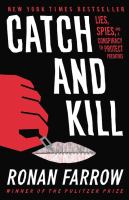

“The Wall Street Journal had just called the (National) Enquirer for comment about a story involving (editor in chief Dylan) Howard and David Pecker, the CEO of the Enquirer’s parent company, American Media Inc. The story alleged that AMI had taken on a sensitive assignment at Donald Trump’s behest, chasing a lead with the objective of not publishing it, but of making it go away. . .In June 2016, Howard had compiled a list of dirt about Trump accumulated in AMI’s archives, dating back decades. After the election, Trump’s lawyer Michael Cohen requested all the tabloid empire’s materials about the new president. There was an internal debate: some were starting to realize that surrendering it all would create a legally problematic paper trail, and resisted. Nevertheless, Howard and senior staff ordered the reporting material that wasn’t already in the small safe exhumed from storage bins in Florida and sent to AMI headquarters. When the reporting material arrived, it was placed first in the little safe and then, as the political temperature around the magazine’s relationship with the president turned white-hot, in a bigger one in the office of human resources head Daniel Rotstein. . . It was only later when one of the employees who had been skeptical started getting jumpy and went to check, that they found something was amiss: the list of Trump dirt didn’t match up with the physical files. Some of the material had gone missing.”
Catch and Kill by Ronan Farrow - 2019
“There was no evidence that the underlying rumor about the ‘love child’ was true. But that spring, a growing number of documents and sources made clear that AMI really had bought the rights to the dubious claim, then worked to prevent its disclosure. In late 2015, Dino Sajudin, a former Trump Tower doorman, had told AMI the story, along with the names of the supposed mother and child. For weeks, National Enquirer reporters pursued the matter. The tabloid retained two private investigators: Danno Hanks, who ran record searches on the family, and Michael Mancuso, a former criminal investigator, who administered a lie-detector test to Sajudin. Several of the reporters doubted Sajudin’s credibility. (His ex-wife would later call him a fabulist. ‘He’s seen the chupachara, ‘ she said. ‘He’s seen bigfoot.’) But the former doorman passed the polygraph, testifying that high-level Trump employees, including Trump’s head of security, Matthew Calamari, had told him the story. Then, David Pecker (CEO of AMI) abruptly ordered the reporters to stop. In November 2015, Sajudin signed an agreement to accept $30,000 for the exclusive rights to the information. Soon after, he met with an AMI reporter at a McDonald’s in Pennsylvania and signed a further amendment, adding a $1,000,000 penalty if the ex-doorman ever disclosed the information without AMI’s permission. The reporter told Sajudin would get his money. Sajudin, seeming pleased, said it was going to be ‘a very merry Christmas.’ As he later did during the McDougal affair, Michael Cohen, Trump’s personal attorney, had monitored the unfolding events closely. ‘There’s no question it was done as a favor to continue to protect Trump,’ one former employee told me.”
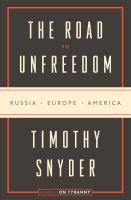

“A Russian oligarch bought a house from Trump for $55 million more than Trump had paid for it. The buyer, Dmitry Rybolovlev, never showed any interest in the property and never lived there- but later, when Trump ran for president, Rybolovlev appeared in places where Trump was campaigning. Trump’s apparent business, real estate development, had become a Russian charade. Having realized that apartment complexes could be used to launder money, Russians used Trump’s name to build more buildings. As Donald Trump Jr. said in 2008, ‘Russians make up a pretty disproportionate cross-section of a lot of our assets. We see a lot of money pouring in from Russia.’ The Russian offers were hard to refuse: millions of dollars upfront for Trump, a share of profits for Trump, Trump’s name on a building- but no investment required from Trump. These terms suited both sides. In 2006, citizens of the former Soviet Union financed the construction of Trump SoHo, and gave Trump 18% of the profits- although he put no money himself. In the case of Felix Sater, the apartments were currency laundromats. A Russian American, Sater worked as senior advisor of the Trump Organization from an office in Trump Towers two floors below Trump’s own. Trump depended on the Russian money Sater brought through an entity known as the Bayrock Group. Sater arranged for people from the post-Soviet world to buy apartments using shell companies. From 2007, Sater and Bayrock were helping Trump around the world, cooperating on at least four projects. Some of these failed, but Trump made money regardless."
The Road to Unfreedom by Timothy Snyder - 2018
"Leaked emails came to the rescue when Trump faced difficulties. On October 7, Trump seemed to be in trouble when a tape revealed his view that powerful men should sexually assault women. Thirty minutes after that tape was published, Russia released the emails of the chairman of Clinton’s campaign, John Podesta, thereby hindering a serious discussion of Trump’s history of sexual predation. Russian trolls and bots helped to work the Podesta emails into two fictional stories, one about a pizza pedophile ring and another about Satanic practices. These served to distract Trump’s supporters from his own confession of sexual predation and helped them to think and talk about something else. About one third of adult Americans chose to believe a Russian fiction about an American politician."
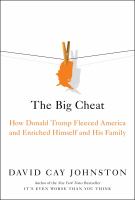

"Trump's tax law also let companies immediately write off every dollar they spent on new capital equipment, like machinery, corporate jets, trucks and robots. Usually, companies must write off these investments over three to 15 years. Immediate total write-offs, known as 'expensing' in tax jargon, are a powerful incentive to buy new equipment. With one caveat. Companies invest in new plants and equipment only when they foresee demand for their products. If people don't have the money to buy appliances, bicycles, cars, furniture, and lawn mowers, there's no point in building a new production line, now or later. Trump and his team addressed this by saying incomes would rise $4,000 a year on average, even $6,000, figures high enough to establish that demand would grow if those increases materialized. The biggest tax break of all, though, was a special one-time forgiveness of a significant portion of corporate taxes that multinational corporations owed since as long ago as 1987 but had not paid because they moved their profits offshore. That wasn't all. Trump didn't require these companies to pony up right now in return for the discounts. Instead, his tax law gave them eight years to pay their deeply discounted taxes. In economic terms, Trump's administration loaned these companies, at zero interest, the amount of taxes they still owed. This repayment was backloaded. In each of the first five years, the companies paid only 8 percent of the discounted tax bill. They will pay 15 percent in the sixth year, followed by payments of 20 percent and finally 25 percent. Imagine if Trump offered you that deal: eight years to pay off just your current-year income taxes, interest free. The biggest beneficiary of this combined tax-discount-and-interest-free-loan program was Apple, which designs its iPhones, wristwatches, and the like in California but hires overseas firms to manufacture the electronics. Much of the work is done in China to take advantage of the super-low wages, meaningless labor laws, and weak pollution controls. Apple stashed more than a quarter of a trillion dollars of profits offshore without paying any tax. The income tax it owed but had yet to pay was $88 billion. That deferred tax bill is greater than the total revenue of all but the 35 largest companies in America. The Trump tax law forgave $50 billion of Apple's obligation, roughly the same amount paid each year in total income taxes by American households with pretax income of less than $800 a week. Trump then loaned Apple the remaining $38 billion. Apple is extraordinarily profitable. It earns more than a 35 percent annual return on its equity. That means investing the loan proceeds should make the company close to $70 billion of investment earnings on the interest-free loan Trump gave Apple, and the company was ahead by $120 billion. Deduct its original $88 billion tax bill, and Trump gave the company back all of the taxes plus an extra 36 cents on each dollar. Would you like that deal? Well, Trump didn't give it to you, only to the big multinationals he claimed were unfairly treating you."
Men Who Hate Women by Laura Bates - 2021
"The 58th Presidential Inaugural Committee's Form 990, a report to the Internal Revenue Service filed by all nonprofits, lists 'other expenses' of $94.3 million. There is little detail in the schedules on the 990. I have written stories based on 990s for decades, and I fill one out each year for DCReport, a charity. The Trump form is sloppy at best. It has irreconcilable numbers, too. Promotional gifts - the swag often handed out at high-end charity events - costing $560,000 are reported deep in the form. Yet the line for fundraising expenses on the summary front page, of which swag is just one component, shows less than $237,000. In line 9, where inaugural ball ticket revenues should be entered along with money from selling memorabilia, the Obama inaugural committee in 2009 reported almost $2 million. Trump's line 9 is blank. Trump's inaugural committee reported almost $4 million in ticketing expenses. It had budgeted close to $8 million. Even the lower figure is an enormous cost that should invite close examination of payments to the ticket-issuing firm. The Obama form showed less than $91,000 in expenses on the line where ticket costs should be listed. Why was Trump's ticket vendor paid so much? Did some of the $4 million make its way back to the Trump family, Gates, Manafort, or anyone else connected to the Trumps? Only a subpoena can answer that question. When guests showed up at inaugural events, the Trump ticketing system let them register using whatever address was recorded when the tickets were purchased or given away. That means Team Trump did not correctly capture their identities. The official record shows that many of the guests at the inaugural balls and other events lived at the addresses of the U.S. Senate and House of Representatives, for example, or various businesses. Somebody seems to have falsified some ticket purchase records. For example, mathematician Katherine Johnson of Hidden Figures fame appeared as a $25,000 donor, her home address shown as the National Aeronautics and Space Administration headquarters. Johnson told a reporter she didn't make a donation, prompting a Trump representative to acknowledge the error. There were at least four donations attributed to people who don't exist, one of them in Singapore. How many fake names and addresses were entered in donor records? How many were foreign agents?"
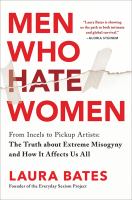

"(Daryush) Valizadeh was one of the first to crow about Trump's victory and was not alone in the manosphere in claiming to have rallied to the president's support during the election. 'The celebrations have ended and we've all come to absorb the fact that Donald Trump is our next president, an outcome that many of us have aggressively worked for in the past several months,' he wrote. He went on to say the following: 'A Trump presidency will improve our standing. . . We now have a s***lord for President who has insulted ugly women as 'fat pigs,' and whose private macho talk, which all masculine men have done, was relentlessly attacked by the press but not punished in the voter booth. . . This means that, when you talk like the Trump, the first thought your listener will have is, 'He sounds like the President of the United States.' Valizadeh's thoughts were echoed across incel forums, in which a typical post at the time, referring to groping, rubbing up against women, and forced kissing, read, 'If Trump can do these things without getting arrested, there is no reason an incel male should not be able to either.' Another said, 'America has spoken wenches, Trump is the president. Nobody cares about your c*** whine anymore. And it is now time to show them this truth.'"
The Big Cheat by David Cay Johnston - 2021
"Jacob Davey at the Institute for Strategic Dialogue told me, 'This mainstreaming component is something we're seeing with the extreme right - by having more central figureheads, who can present a slightly more sanitized version of an ideology in a way [that] is easily consumable and seems [a] bit more acceptable, that very much opens the door for more fringe members to advance [that] ideology.' But in order for them to successfully smuggle their cargo of division, fear, and hatemongering, a delicate balancing act is necessary. The men who help to usher trends from the fringes of internet extremism onto our airwaves and into our living rooms must at once continue to appeal to the denizens of online communities, hitting the ideological keynotes that will chime with trolls and members of the manosphere, yet simultaneously package their message behind a veneer of 'reasonable' debate and respectable (if unpopular) opinion for public consumption. In short, dog-whistle rhetoric, coded language, and sometimes outright self-contradiction are required. Some of these men are cashing in on trends driven by manosphere communities, perhaps without even realizing who they are appealing to. For others, the decision to appeal to certain groups seems to be more deliberate. For political figures like Donald Trump and his advisors, such as former chief strategist Steve Bannon, there are gains to be made by issuing dog whistles to the alt-right and manosphere communities. Such rhetoric, like Trump's derisive advice to four Democratic congresswomen of color and American citizens to 'go back' to the countries they originally came from, is greeted with wild applause across the masses frequenting extremist websites. But a buffer of plausible deniability is also important in order to avoid alienating a more mainstream base; a feat achieved by publicly disavowing racism and white supremacy, even while his own statements seem to send a very different messages."
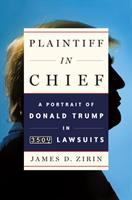

"Trump was up to his ears in contentious confrontation with regulators. While many in business routinely find themselves at the receiving end of a regulatory inquiry, Trump seemed to have a propensity to skirt the law and ignore legal requirements. You might blame this on bad lawyering except that he had the advice of the best available. Trump got so much trouble with regulators because, if his business practices were not illegal, he himself was antilegal, i.e., determined to circumvent laws that limited his business activity. Trump was no stranger to the federal money-laundering statutes. ('Money laundering' is the generic term used to describe the process by which criminals disguise the origin and ownership of the fruits of criminal conduct by making such proceeds appear to have been derived from a legitimate source.) In 1998, the Financial Crimes Enforcement Network (FinCEN) of the U.S. assessed a $477,700 civil fine against the Trump Taj Mahal for currency transactions reporting violations. Casinos handling large sums of cash, possibly representing laundered funds, are required by law to keep meticulous records and watch out for 'red flags' evidencing suspicious transactions. The Taj Mahal was a continuing violator of the anti-money laundering statutes. Federal examiners found violations at the Taj during the three-year period from 2010 to 2012. The Taj failed to police such suspicious transactions as patrons exchanging large sums of cash for gambling chips or paying large cash sums for other goods or services. Trump failed to get the message. Years later, Trump was still in trouble with FinCEN over his Atlantic City casinos. 'Trump Taj Mahal received many warnings about its deficiencies,' said Jennifer Calvery, the then FinCEN director. 'Like all casinos in the country, Trump Taj Mahal had a duty to protect our financial system from being exploited by criminals, terrorists, and other bad actors.' The violations, the details of which are unknown, must have been egregious. FinCEN said that the conduct of the Taj Mahal 'left. . . our financial system unacceptably exposed.' In March 2015, three months before Trump announced his candidacy for president, FinCEN imposed a $10 million civil fine on the Trump Taj Mahal for 'willful and repeated violations of the Bank Secrecy Act,' notably a failure to report millions of dollars in suspicious transactions, properly file currency transaction reports, and keep proper records. The agency noted the long history of Taj violations of the money-laundering statutes, going back to the 1990s, when it opened. The fine was the largest in history for violation of the Bank Secrecy Act. It involved a staggering 106 violations. The Taj had filed for bankruptcy in 2014, and the bankruptcy court approved the settlement the following year. No one was ever charged with criminal conduct."
Plaintiff in Chief by James D. Zirin - 2019
"Most people seek to avoid a lawsuit if they can. Litigation is costly, distracting, and time-consuming. The result can be imperfect. . .But, litigation is supposed to be an orderly pursuit of truth and justice. . . As his life in court evolved, Trump saw litigation as being only about winning. He sued at the drop of a hat. He sued for sport; he sued to achieve a sense of control; and he sued to make a point. He sued as a means of destroying or silencing those who crossed him. . . He sued to make headlines, for the entertainment value, and to reinforce his power over others. At the end of the day, he abused the process of the law. According to USA Today, in the decades prior to becoming a president, he became a perennial litigant, involved in more than 3,500 lawsuits, proceedings, and investigations (lest anyone think this is fake news, the American Bar Association counts 4,000). Bloomberg News reported in 2016 that Trump had racked up 1,300 suits since 2000, including 72 in federal court. . . Trump saw law not as a system of rules to be obeyed and ethical ideals to be respected but as a potent weapon to be used against his adversaries or a hurdle to be sidestepped when it got in his way. While real estate operators are a notoriously litigious bunch who commonly run into legal disputes with contractors, tenants, and architects, Trump has had cases or controversies, either as plaintiff or defendant, in virtually all of his business ventures. The sheer volume of his litigation is astounding. And, aside from filed lawsuits, he sent innumerable cease-and-desist letters threatening to punish competitors, journalists, publishers, or anyone else who might write or say unflattering things about him. He seemed obsessed with his reputation and the Trump name, which became his brand. Lawsuits alleging serious wrongdoing, claims counterclaims, false denials, inconsistent positions, investigations, subpoenas directed to close associates, carefully tailored testimony, scandalous allegations, and subversion of his adversaries were nothing new to him. The legal wagons protecting him had been drawn in a circle for many years."
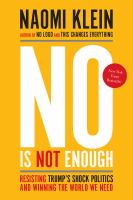

No is Not Enough by Naomi Klein - 2017
“Trump knows as well as anyone that the idea of American corporations returning to 1970s-style manufacturing is a cruel joke. He knows this because, as his own business practices attest, a great many US companies are no longer manufacturers at all, but hollow shells, buying their own products from a web of cheap contractors. He may be able to bring back a few factories, or claim he did, but the numbers will be minuscule compared with the need. . . Trump’s game plan, which is already under way, is to approach the unemployment and underemployment crisis in the same way he approaches everything-as a spectacle. He will claim credit for a relatively small number of jobs-most of which would have been created anyway-and then market the hell out of those supposed success stories. It won’t matter one bit whether the job numbers support his claims. He’ll edit reality to fit his narrative, just as he learned to do on The Apprentice, and just as he did on his very first day as president, insisting, against all objective evidence, that the inauguration crowds had been historic. This is what Trump does, and has always done. In 1992, when his empire was teetering on the edge of bankruptcy thanks to a series of bad investment decisions, he didn’t deal with the situation by getting his finances in order. Instead he threw an elaborate ‘comeback party’ for his investors and financiers at the Trump Taj Mahal in Atlantic City, which culminated in Trump-wearing satin boxer shorts and red punching gloves-punching through a paper wall to the theme song of Rocky. This is a man who thinks he can solve anything with the right stage-managed performance, and very often in the past he’s been proven right. So just as he spun and performed his way out of bankruptcy, he is convinced he can do the same with the country’s economy.”
“One noticeable thing about Trump’s contractor appointees is how many of them come from firms that did not even exist before 9/11: L1 Identity Solutions (specializing in biometrics), the Chertoff Group (founded by Bush’s Homeland Security director Michael Chertoff), Palantir Technologies (a surveillance/big data firm cofounded by PayPal billionaire and Trump backer Peter Thiel), and many more. Security firms draw heavily on the military and intelligence wings of government for their staffing. Under Trump, a remarkable number of lobbyists and staffers from these firms are now migrating back to government, where they will very likely push for even more opportunities to monetize the hunt for people President Trump likes to call ‘bad hombres.’ This creates a disastrous cocktail. Take a group of people who directly profit from war and then put those same people at the heart of government.”


“On substance, we organized a meeting for the president at Kensington Palace with a group of top UK and London-based U.S. business leaders, one of his favorite types of meetings. The intent was to showcase the close economic ties between the two countries and areas of innovation and potential future growth in relations, including in the pharmaceutical, financial technology, and large-scale construction sectors. Queen Elizabeth’s son Prince Andrew, who at that point was an envoy for British business, was also in attendance. We presumed that the meeting would maintain the president’s attention on substantive issues. But instead of engaging with the business leaders, President Trump focused on his daughter Ivanka. Trump had taken Ivanka along to the meeting. Now he made her the centerpiece, pushing some of the key staff from the table to seats along the wall. Acting like proverbial proud parent, the president continually brought the discussion back to what Ivanka was doing with her various White House projects. Praising her for signing up businesses for training schemes to bring women into the workplace, he claimed that Ivanka single-handedly created thousands of jobs and encouraged others at the table to praise her too. He paid perfunctory attention to the issues the UK and U.S. business leaders wanted to raise. This was a Trump family show. Most of Trump’s meetings with foreign business leaders that I attended were, like the episode in Kensington Palace, more about holding court than holding forth on issues of concern for American workers. Sometimes the president took bizarre turns into rambling monologues completely lacking in substance. It was becoming clear that this was how the man who had ridden into the White House on the grievances of ordinary Americans was going to fritter away his time in office - forcing captive audiences to indulge him as he went off on personal tangents."
There is Nothing for You Here by Fiona Hill - 2021
“Trump fixated on how women looked on TV as well as in person. If they were having an off day or had some physical feature - height, weight, the appearance of their hair or skin - that he didn’t like, he would point it out to others and to their face in public. Trump would frequently belittle female aides, including senior women, in front of their counterparts- none of whom would intercede on their behalf. Just being a woman was an obstacle to getting their job done. . . In the Trump White House, Ivanka Trump and Fox News set the dress code for women. . . many of the young female staffers running around the West Wing had indeed worked at some point at Fox or other cable news channels and print outlets. I knew that style and it was constantly reinforced.”
“According to his financial filings, his single largest asset is not a building or a golf course or resort but his ‘brand’ - meaning the financial potency he believes in is attached to his name. . . Trump is very touchy about his bankruptcies and in fact insists from time to time that he has never been in bankruptcy, which is not exactly honest: he has never filed for bankruptcy under Chapter 7 or Chapter 13, the personal sections of the bankruptcy code, but has repeatedly taken recourse to Chapter 11, under which business bankruptcies are adjudicated. What means is only Trump has the good sense to form corporations to shield his personal assets from the worst of his personal incompetence.”
The Case Against Trump by Kevin D. Williamson - 2015
